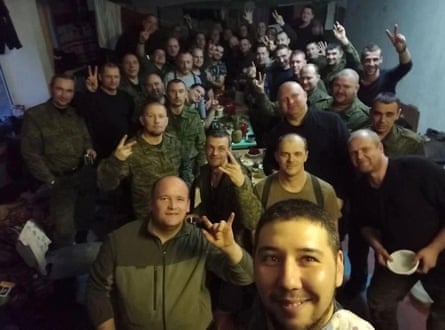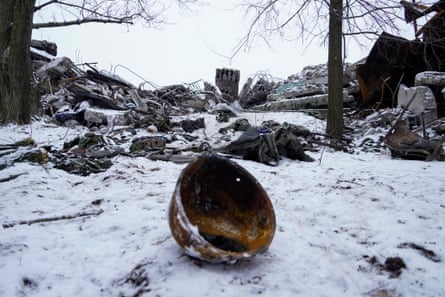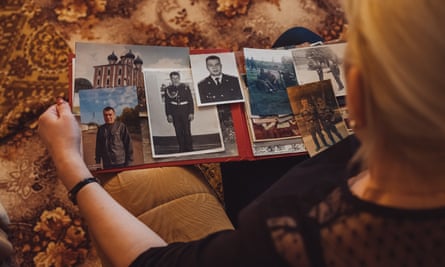Fifteen minutes before midnight, a young Russian conscript named Danila, who had been sent to fight in Ukraine, picked up his phone to write a message to his family and friends back home in a small town in the Samara region. It was 31 December.
“We congratulated each other, wished each other the best for the new year, and then he was gone,” said a close friend who wrote with him that night.
Minutes later, a US-made Himars rocket slammed into Professional Technical School No. 19 in Makiivka, a city in eastern Ukraine under Russian occupation. It took nearly 50 days for Danila’s remains to be identified beneath the rubble. His family spent weeks calling local hospitals and a military hotline, where they were told to wait for news that never seemed to come.
The massive strike that killed at least 100 soldiers from a single Russian region, most of them mobilised to fight in Vladimir Putin’s invasion of Ukraine, exhibits the tensions on the home front that have been stoked by the war, and how the Kremlin has dipped into a deep well of patriotism and propaganda to maintain its war effort despite the deaths of tens of thousands of Russian soldiers in the past year.
The friend, who agreed to speak with the Guardian anonymously, described Danila, in his early 20s, as a welder who had worked for an uncle in Crimea before returning to his native Samara for the weekend and receiving a summons to go to war.
As a self-professed patriot who said he would “never let Russia be occupied”, he did not try to dodge the draft. “When he got his call-up papers, he immediately said that he was going,” said the friend. “He said, ‘What am I, some bum or loser to run away from this? That means my fate is to be a soldier.’”

Danila was sent to nearby Tolyatti for training, then on to another training ground outside Samara, and finally on to “that fucking technical college” in Makiivka where they waited to be sent to the front, as the friend said.
The building was overcrowded, with hundreds of soldiers quartered inside. Military officials originally blamed the soldiers themselves for making telephone calls before the strike, possibly allowing Ukrainian forces to triangulate their position. But friends and families have angrily rejected that claim. “That’s ridiculous,” said the person. “All of Makiivka knew they were living there.”
Even after the funerals and memorials for the scores of Russian soldiers killed in the strike, dozens of soldiers from the attack are still listed as missing. “Not knowing is worse than anything,” the friend said last week while the search was ongoing. “Because you have no official confirmation that he is dead.
“And we believe that he is still alive.”
Only late last week were Danila’s remains finally identified. He was buried on Monday.
The Makiivka strike is the worst confirmed single strike suffered by the Russian army since the beginning of the war, perhaps matched only by the sinking of the Moskva cruiser, in which dozens died. And it is certainly the most lethal strike to hit a single region, with a probable death toll of 100, and dozens more according to some estimates.
Officially, Samara’s authorities have admitted 89 deaths in the rocket strike. But journalists have identified more than 100 dead, and online activists had identified another several dozen who are still missing, either officially or according to close relatives.
One on those lists is Timofey Spirkin, a 19-year-old mobilised soldier, who also disappeared the night of the missile strike, said a family friend. Some burials have taken place based on the identification of DNA evidence alone. But in his case, even that has not helped.
“There’s still no news,” said the family friend. “His mother had her DNA taken a long time ago. But they say that there has been no match.” In a selfie of several dozen mobilised soldiers taken minutes before the strike, she pointed out Spirkin in a black long-sleeve shirt, flashing a peace sign with two fingers in the air.
“He’d called just a few minutes earlier,” she said.
The deaths have led to a backlash among families and among the mobilised soldiers of the 1444 regiment, who had complained about being disbanded and being denied full compensation for their military service. “We’ve even been told that since we weren’t on the front, we wouldn’t receive combat pay,” said one mobilised soldier earlier this month.

Days later, the government responded with force. Two of the men were marched out of a military police van in handcuffs and forced to apologisedfor the public videos. “These kinds of videos only play into the hands of our enemy,” said another soldier, who was forced to apologise.
In online public chats for mobilised soldiers and their family members, there is a clear tug-of-war over messaging: while criticism of the military is rife, there is less open opposition to the war and almost no sympathy for Ukrainian suffering.
“People are suffering,” said Irina, the wife of a soldier and one of the group’s most active critics of the Russian military. “Society is shocked by the support of the European Union and the United States of an openly Nazi regime,” a trope used by Putin and on Russian state media to describe Ukraine.
Apparently spooked by the possibility of public outrage, the government quickly arranged for public memorial services within days of the rocket strike. On 3 January, public officials laid flowers at a memorial to the second world war, promising aid to affected families as well as “revenge”.
Vladimir Zvonovsky, a Samara-based sociologist, said the public ceremony was a clear attempt to head off public anger – and possible protest – over the strike.
“It was an obvious strategy to try to intercept any kind of initiative and show unity with the people,” Zvonovsky said in his Samara office. “If I had a friend or, God forbid, a relative who died there, I would probably watch television and think yes, the authorities at least are upset as well; they aren’t staying silent.”
“I can’t say that this should have been the moment society exploded,” he added. “If it hadn’t exploded yet, why would this set it off?”
Ekaterina Kolotovkina, the head of an advisory group of army spouses and the wife of Maj Gen Andrei Kolotovkin, a high-ranking military commander, was one of the headline speakers at the government-organised memorial. She had a simple message: “We cannot be broken.”

“What happened in Samara had the reverse effect from what our enemies planned,” she said in an interview at Samara’s House of Officers, a military club with a large theatre. “The people have become one whole. We are helping one another. Now we all understand who our true enemy is.”
Kolotovkina’s efforts at inspiring military discipline on the home front go further. She is also the creator of a project called Wives of Heroes, a glossy photo project where Russian women don their husbands’ military uniforms and pose for studio portraits. The idea has sparked similar photo exhibitions across Russia.
“My mission is to raise children. My mission is to support [my husband],” she said. “We are officers’ wives. For the wives of mobilised soldiers, it is much harder … But I think they’re slowly coming to terms with what is happening.”
The project stands in contrast to how many families in Russia have felt in recent months – angry, confused, sometimes abandoned. When asked about the people who have complained, she interrupts.
“Let’s say honestly, who’s writing these complaints?” she said. “Maybe 2% of the mobilised soldiers there? Not everyone is strong. There are men who also behave like children. So what if 10, 20 people there write some statement and create panic? As a person who travels there periodically, I see strong men intent on victory.”
In her speech on 3 January on the square following the Makiivka attack, she said she had spoken to her husband and told him to “get revenge for the orphans, for the inconsolable widows and for the tears of the mothers”.
She defended the use of violence against people that she describes as “brothers”.
“It’s a brotherly people that have become brainwashed,” she said of Ukraine. “What does an older brother do if the younger doesn’t listen? Can’t he hit him about the head? I think that’s completely within his rights.”
In the basement of the House of Officers, there are sacks of sweets, medicines, knitted gloves, jars of honey, boxes filled with garlic, cards written by schoolchildren, and even iron field stoves wrought by convicts in a local prison. All of this is being sent to the front, said Kolotovkina.
Anya, a volunteer whose husband is a captain in the Russian army, said she began working there during her husband’s deployments. When asked if she knows anyone against the war, she said no.
“Say you once had a friend who was close and dear to you. And then God forbid I find out that he has different views [about the war] with me. I’d regret that we had anything in common,” she said. “There’s no one like that in my circle … thank God I haven’t had to deal with that.”
The situation is typical. A year into the war, there is muted protest or public agitation against the war, even in Russia’s mid-sized cities where there were demonstrations last February.
“We can see that in the polling around Russia,” said Zvonovsky. “People don’t have an alternative point of view. How can you look at this world, evaluate the current situation, if everything you considered correct until yesterday is now wrong. What is right, then?”
In cemeteries outside the city, there are dozens of freshly dug graves. The skull-in-crosshairs flag of Wagner, the mercenary company linked to Yevgeny Prigozhin, waves over the Rubezhnoye cemetery. Nearby, there are fresh graves of five men from Samara who died on 1 January, adorned with wreaths and flags of military services. In another cemetery, a guard furiously demands to know what two journalists are doing “near the Wagner graves”. Another half-dozen graves have already been dug nearby.

A visit by a Guardian reporter to this region of Russia attracts attention. On highways and in local towns, there are regular signs of surveillance. On an empty road in a small town, a man turns a corner, walks up and asks, “Are you the journalists?” Then he walks away.
In Neftegorsk lives the family of a deceased captain named Alexander, who died in November last year while fighting in eastern Ukraine. A veteran who had fought in Chechnya and Dagestan, he had tried repeatedly to volunteer for the war and even travelled to Ukraine on his own without telling his family before eventually being mobilised in October.
In peacetime, he worked at a furniture company. He never spoke to his family about why he was so eager to go fight.
“He was a reconnaissance officer,” said Natalya, his sister, sitting with her family in their home. “He never showed his emotions. Even the fact that we’re meeting with you now, that we buried him like a hero, he wouldn’t like it. He didn’t like this showing off or bragging. So he didn’t say anything about Ukraine to us. He wanted to defend his homeland like any soldier brought up in this patriotic way.
“Of course, we were upset when he got [the call-up papers],” she said. “We see this is a different kind of war, not like Chechnya or Dagestan. It’s a scary war. When America has turned all countries against Russia. How could any person let their son, husband, brother into that kind of war?
“But it would be a disgrace not to go. You’d disgrace yourself,” she said. “You would be ashamed.”
As the other relatives spoke, Alexander’s mother would occasionally tear up as she spoke about her son. Sasha, as his family call him, was killed in an artillery strike. But his sister admitted that “all we know is what we’ve been told”.
“We don’t even really know if it’s him that we buried,” said Natalya. “The casket is closed. They just gave us some of his personal things and that’s it. So how are we supposed to know?” He was buried in the same grave as his father, she said.
The whole family defends Putin’s announcement a year ago that Russian troops would be sent to Ukraine. The west is to blame for the war, they say. “[Putin] had no choice,” said Maria, another relative.
A year after the war has begun, the family of the dead captain are asked whether their opinion on the Russian “special military operation” has changed.
“More for it,” said Maria. “We support it more.”
"conflict" - Google News
February 23, 2023 at 04:28AM
https://ift.tt/A6ND5TL
‘It’s a disgrace not to go to war’: muted Russian protest against Ukraine conflict - The Guardian
"conflict" - Google News
https://ift.tt/bVFpmK1
https://ift.tt/g8bYl9m
Bagikan Berita Ini














0 Response to "‘It’s a disgrace not to go to war’: muted Russian protest against Ukraine conflict - The Guardian"
Post a Comment